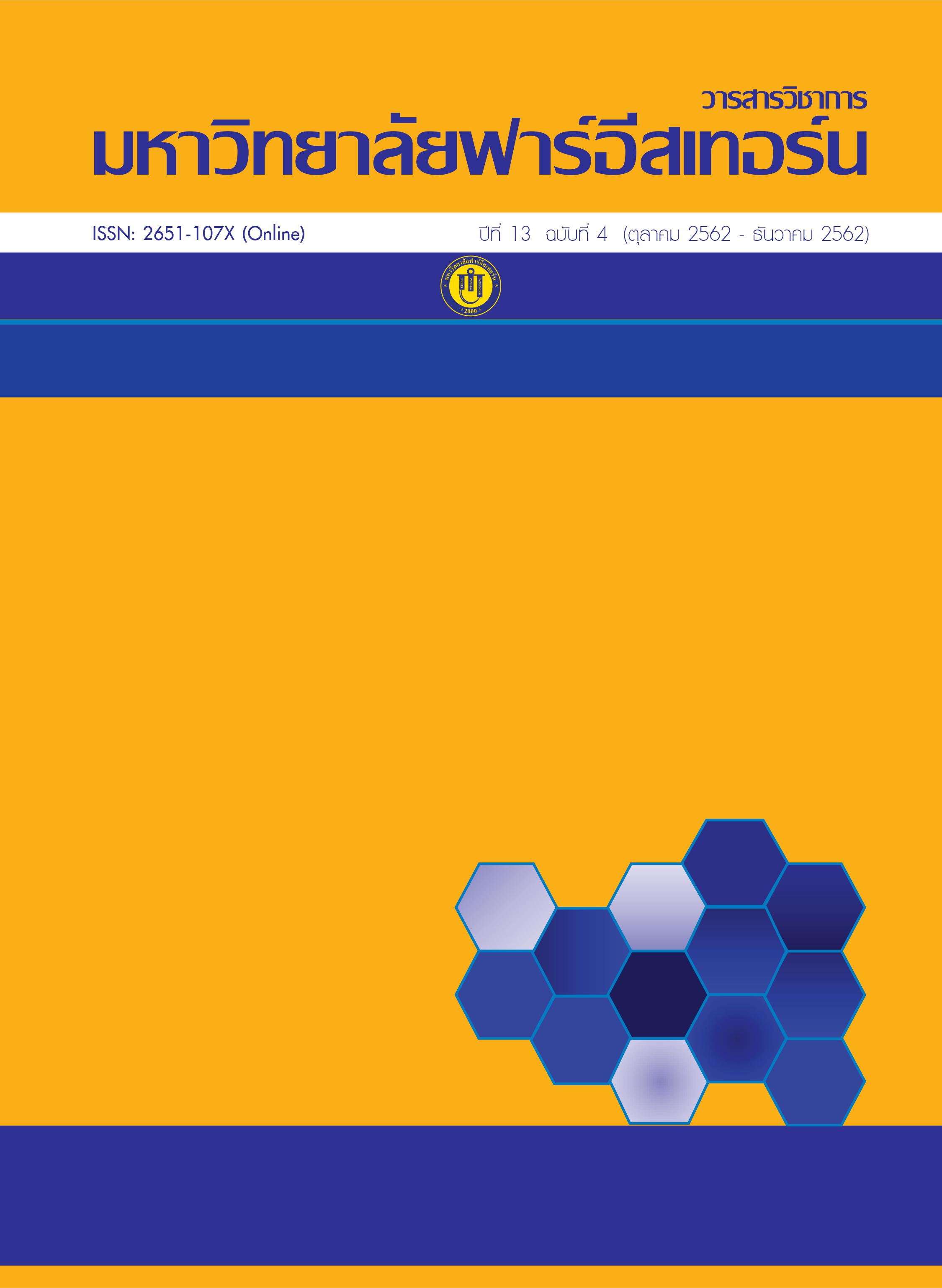ผลการใช้กิจกรรมการเรียนรู้นอกห้องเรียนในการพัฒนาทักษะภาษาอังกฤษเพื่อการสื่อสารของนักเรียนชั้นมัธยมศึกษาปีที่ 1 โรงเรียนบ้านศาลา ตำบลดอนแก้ว อำเภอแม่ริม จังหวัดเชียงใหม่
Main Article Content
บทคัดย่อ
งานวิจัยในครั้งนี้มีวัตถุประสงค์เพื่อเปรียบเทียบผลสัมฤทธิ์ทางการเรียนทางด้านทักษะภาษาอังกฤษเพื่อการสื่อสารในรายวิชาภาษาอังกฤษของนักเรียนชั้นมัธยมศึกษาตอนต้นก่อนและหลังการเรียนโดยใช้กิจกรรมการเรียนรู้นอกห้องเรียน และเพื่อศึกษาความพึงพอใจของนักเรียนในการเรียนโดยใช้กิจกรรมการเรียนรู้นอกห้องเรียน โดยกลุ่มตัวอย่างในการวิจัยได้แก่นักเรียนในระดับมัธยมศึกษาปีที่ 1 โรงเรียนบ้านศาลา ตำบลดอนแก้ว อำเภอแม่ริม จังหวัดเชียงใหม่ จำนวน 74 คน เครื่องมือที่ใช้ในการวิจัยในครั้งนี้ คือ แผนการจัดกิจกรรมการเรียนรู้นอกห้องเรียนในรายวิชาภาษาอังกฤษ จำนวน 8 แผน แบบวัดทักษะภาษาอังกฤษ
เพื่อการสื่อสารภาษาอังกฤษ และแบบสอบถามในรูปแบบมาตราส่วนประมาณค่า 5 ระดับเพื่อวัดความพึงพอใจของนักเรียนที่มีต่อการเรียนโดยใช้กิจกรรมการเรียนรู้นอกห้องเรียนในการวิเคราะห์ข้อมูล ใช้ค่าสถิติ ได้แก่ค่าเฉลี่ย ส่วนเบี่ยงเบนมาตรฐานและการทดสอบค่าที ผลการวิจัยพบว่าผลสัมฤทธิ์ทางการเรียนทางด้านทักษะภาษาอังกฤษเพื่อการสื่อสารหลังเรียนโดยใช้กิจกรรมการเรียนรู้นอกห้องเรียนสูงกว่าก่อนเรียนอย่างมีนัยสำคัญทางสถิติที่ระดับ .01 และนักเรียนมีความพึงพอใจในระดับมาก
Article Details
1. ทัศนะและข้อคิดเห็นใดๆ ในวารสารนวัตกรรมสังคมและการเรียนรู้ตลอดชีวิตเป็นทัศนะของผู้เขียน กองบรรณาธิการไม่จำเป็นต้องเห็นพ้องด้วยกับทัศนะเหล่านั้นและไม่ถือว่าเป็นความรับผิดชอบของกองบรรณาธิการ
2. ความรับผิดชอบด้านเนื้อหาและการตรวจร่างบทความแต่ละบทเป็นของผู้เขียนแต่ละท่าน กรณีมีการฟ้องร้องเรื่องการละเมิดลิขสิทธิ์ถือเป็นความรับผิดชอบของผู้เขียนแต่เพียงฝ่ายเดียว
3. ลิขสิทธิ์บทความเป็นของผู้เขียนและมหาวิทยาลัยฟาร์อีสเทอร์นได้รับการสงวนสิทธิ์ตามกฎหมาย การตีพิมพ์ซ้ำต้องได้รับอนุญาตโดยตรงจากผู้เขียนและมหาวิทยาลัยฟาร์อีสเทอร์นเป็นลายลักษณ์อักษร
เอกสารอ้างอิง
Augwattanakul, S. (1997). English teaching method. Bangkok: Chulalongkorn University Press.
[in Thai]
Dowling, M. (2005). Young children’s personal, social and emotional development. London: Paul Chapman.
EF Education First. (2018). EF English Proficiency Index. Retrieved February 2, 2019, from https://www. ef.co.th/epi/.
Fagerstam, E. (2012). Perspectives on outdoor teaching and learning. Sweden: Linkoping University.
Fenton, M. G. (1996). Back to our roots in nature’s classroom. Young Children. 51(3), 8-11.
Gilberton, K. ; Bates, T. ; McLaughlin, T. & Ewert, A. (2006). Outdoor education methods and strategies. Champaign, IL: Human Kinetics.
Gunseli, Y. & Guzin, O. A. (2017). The effect of outdoor learning activities on the development of preschool children. South African Journal of Education. 37(2), 1-9.
Hammerman, D. R. ; Hammerman, W. M. & Hammerman, E. L. (1985). Teaching in the outdoors. Danville, IL: Interstate.
Hammerman, R. D. (1994). Teaching in outdoor. New York: Maryland.
Jitsathaporn, S. (1992). Field trip techniques. Songkha: Faculty of Education, Srinakharinwirot University. [in Thai]
John, L. & Ehow, C. (2011). Factors affecting quality of English language teaching and learning. Retrieved October 5, 2018, from https://www.ehow.com/info_8040040_factors-english-language-teaching-learning.html.
Lappin, E. (2000). Outdoor education for behavior disturbed students. Retrieved from ERIC Digest. (ERIC Identifier: ED261811).
Limtasiri, O. (2017). The Study of outdoor learning to enhance learnings skill in 21 Century. Veridian E-Journal, Silpakorn Univeristy. 10(3), 1643-1658. [in Thai]
Office of the Education Council. (2014). Ministry of education chart. Retrieved February 2, 2019, from https://www.moe.go.th/new_stru/images/pic_newstruc6.gif. [in Thai]
Parsons, A. (2011). Young children and nature: Outdoor play and development, experiences fostering environmental consciousness, and the implications on playground design. (Unpublished master thesis, Virginia Polytechnic Institute and State University).
Priest, S. (1990). The semantics of adventure education. In J. C. Miles & S. Priest (Eds). Adventure Programming. (pp. 111-115). State College, PA: Venture.
Saeidi, A. & Sulaiman, S. (2008). Attitudes and satisfaction of Mattayom 4-5 students in attain towards the English Camp Activities. Faculty of Humanities and Social Sciences Journal. 4(1), 2008. [in Thai]
Sharp, L. B. (1973). Basic consideration in outdoor and camping education. New York:
The Bulletin of The National Association of Secondary school Principals. Retrieved October 10, 2018, from https://journals.sagepub.com/doi/abs/10.1177/019263654 703114707.
Smith, J. (1955). Outdoor education and youth. Washington, DC: AAHPER.
Srikrai, P. S. (2008). Project-based learning in EFL classroom. Journal of Humanity and Sociology of Khonkaen university. 25(1), 53-79. [in Thai]
Swan, M. P. (1970). Trip and tricks in outdoor education. Illinois: The Interstates Printer & Publishers.
Vanitbuncha, K. (1997). The analysis of statistics: Statistics for making decisions. Bangkok: Thammasan Company.
Walberg, H. J. (1989). The effective teacher. New York: McGraw-Hill.
Watcharajinda, A. (2009). A study of management satisfaction and problems of the English program in schools under the Office of Education Inspector, Region 11, Thailand. (Master’s thesis, Applied Linguistics, Prince of Songkla University). [in Thai]
Wiengnil, A. (2010). A study of out-of-class English language learning activities of secondary school students in English Program. Bangkok: Chulalongkorn University. [in Thai]
Wiengnil, A. & Wasanasomsithi, P. (2008). A study of out-of-class English language learning activities of secondary school students in English program. Princess of Naradhiwas University Journal. 4(1), 72-83. [in Thai]
Wongsathian, N. (2000). Effects of formative assessment on motivation and learning outcomes of first year students at Wang Klai Kangwon Campus, Rajamangala Institute of Technology. (Master’s thesis, Master of Arts (Applied Linguistics), Graduate School, Mahidol University, Bangkok (Thailand)). [in Thai]

